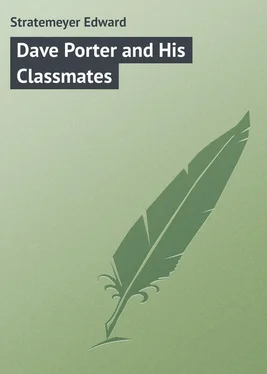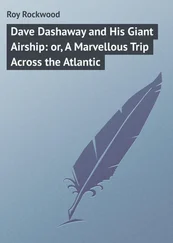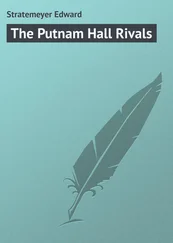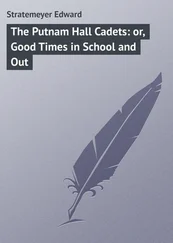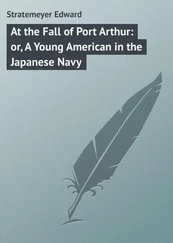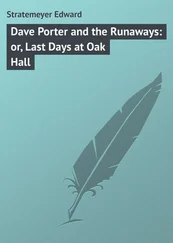Edward Stratemeyer - Dave Porter and His Classmates
Здесь есть возможность читать онлайн «Edward Stratemeyer - Dave Porter and His Classmates» — ознакомительный отрывок электронной книги совершенно бесплатно, а после прочтения отрывка купить полную версию. В некоторых случаях можно слушать аудио, скачать через торрент в формате fb2 и присутствует краткое содержание. Жанр: foreign_language, foreign_prose, на английском языке. Описание произведения, (предисловие) а так же отзывы посетителей доступны на портале библиотеки ЛибКат.
- Название:Dave Porter and His Classmates
- Автор:
- Жанр:
- Год:неизвестен
- ISBN:нет данных
- Рейтинг книги:4 / 5. Голосов: 1
-
Избранное:Добавить в избранное
- Отзывы:
-
Ваша оценка:
- 80
- 1
- 2
- 3
- 4
- 5
Dave Porter and His Classmates: краткое содержание, описание и аннотация
Предлагаем к чтению аннотацию, описание, краткое содержание или предисловие (зависит от того, что написал сам автор книги «Dave Porter and His Classmates»). Если вы не нашли необходимую информацию о книге — напишите в комментариях, мы постараемся отыскать её.
Dave Porter and His Classmates — читать онлайн ознакомительный отрывок
Ниже представлен текст книги, разбитый по страницам. Система сохранения места последней прочитанной страницы, позволяет с удобством читать онлайн бесплатно книгу «Dave Porter and His Classmates», без необходимости каждый раз заново искать на чём Вы остановились. Поставьте закладку, и сможете в любой момент перейти на страницу, на которой закончили чтение.
Интервал:
Закладка:
"After I go back to boarding school where are you and Laura and Uncle Dunston going to stay?" questioned Dave of his father.
Mr. Porter smiled faintly. "I have a little secret about that, Dave," he answered. "I'll tell you later – after everything is ripe."
"I know the Wadsworths would hate to have me leave them – and Professor Potts won't want me to go either."
"Well, you wait, Dave, – and see what comes," answered his father; and with this the lad had to be content.
Bright and early Monday morning the three boys had breakfast and started for the depot, to take the train for Oakdale, the nearest town to Oak Hall. Laura, Jessie, and Mr. David Porter went along to see them off.
"Now, Dave, I want to see you make the most of this term at school," said Mr. Porter. "Now you have Laura and me, you won't have so much to worry about."
"I'll do my level best, father," he answered. "We want you to come out at the top of the class," said Laura.
"And Dave can do it too – I know he can," remarked Jessie, and gave him a sunny smile of encouragement.
"How about us poor chaps?" asked Roger. "Can't we come in somewhere?"
"Yes, you must come in right after Dave," answered Laura, and this made everybody laugh.
"The higher we get in school the harder the work becomes," came from Phil. "But I am going to peg away at it – provided the other fellows will let me."
"Phil always was very studious," said Dave, with an old-time grin spreading over his face. "He'd rather study a problem in geometry or translate Latin than read a story book or play baseball; wouldn't you, Phil?"
"Not much! and you know it. But if a fellow has got to grind, why – "
"He can grind – and play baseball, too," added Mr. Porter. "My parting advice is: when you study, study for all you are worth, and when you play, play for all you are worth."
"Here comes the train!" cried Laura, and turning, she kissed her brother. "Good-bye, Roger; good-bye, Phil!"
"Good-bye!" came from the others, and a general handshaking followed. Then the three chums ran for the train, got aboard, and were off for school once more.
CHAPTER III
ON THE WAY TO SCHOOL
"There is one thing I've forgotten to mention to you," said Phil, as the train rolled on its way and Crumville was left far behind. "That is that this term Doctor Clay has offered a special set of prizes to the students standing highest in various subjects. There is a prize for history, another for Latin, and a third for English literature and theme-writing. In addition there is to be a special prize for the student who can write the best paper on 'The Past and Future of our Country.' This last contest is open only to those who stand above the eighty per cent. level in their classes."
"That's interesting," answered Dave. "How many reach that level, do you think, Phil?"
"Not more than thirty all told, and of those I don't believe more than twenty will send in papers."
"Dave, you ought to try," said Roger. "You were always good at composition."
"So are you, Roger."
"I'm not as good as you, and I know it. I like history more than anything else, and I guess I'll try for that prize."
"Well, what is the past of our country but history?" continued Dave, with a smile.
"That part might be easy; but what of the future? I'm no good at prophesying."
"Oh, couldn't you speak of the recent inventions and of what is coming – marvelous submarine boats, airships, wireless telegraphy, wonderful cures by means of up-to-date surgery, and then of the big cities of the West, of the new railroads stretching out everywhere, and of the fast ocean liners, and the Panama Canal, and the irrigation of the Western dry lands, and – "
"Hold on, Dave!" cried Phil. "You are giving Roger all your ammunition. Put that in your own paper."
"Oh, there's a whole lot more," was the smiling answer. "The thirty-and forty-storied buildings in our big cities, the underground railways, the tubes under the rivers, the tremendous suspension bridges, the automobile carriages and business trucks, – not to mention the railroad trains that are to run on one rail at a speed of a hundred miles an hour. Oh, there are lots of things – if one only stops to think of them."
"The prize is yours, Dave!" exclaimed the senator's son. "You've mentioned more in three minutes than I would have thought of in three weeks. I'll stick to history."
"And I'll stick to English literature – I'm pretty well up on that, thank goodness!" said the shipowner's son.
After that the talk drifted to other things – of the doings of the students at Oak Hall, and of how Job Haskers, one of the assistant teachers, had caught some of the lads playing a trick on Pop Swingly, the janitor, and punished them severely for it.
"The trick didn't amount to much," said Phil, "and I rather believe Swingly enjoyed it. But old Haskers was in a bilious mood and made the fellows stay in after school for three days."
"Were you in it?" asked Dave.
"Yes; and all of us have vowed to get square on Haskers."
"It's a wonder Doctor Clay doesn't get rid of Haskers – he is so unpopular," was Roger's comment.
"Haskers is a fine teacher, that's why he is kept. But I like Mr. Dale much better," said Dave.
"Oh, everybody does!"
"All but Link Merwell," said Phil. "Isn't it strange, he seems to get along very well with Haskers."
"Two of a kind maybe," returned the senator's son.
After a long run the Junction was reached, where the boys had to change cars for Oakdale. They got off and found they had twenty-five minutes to wait.
"Remember the time we were here and had the trouble with Isaac Pludding?" asked Roger.
"I'll never forget it," answered Dave, with a grin. "By the way, as we have time to spare let us go around to Denman's restaurant and have a cup of chocolate and a piece of pie. That car was so cold it chilled me."
Growing boys are always hungry, so, despite the generous breakfast they had had, they walked over to the restaurant named. The man who kept it remembered them well and smiled broadly as they took seats at a table.
"On your way to school, I suppose," he said, as he served them. "Ain't following up Ike Pludding this trip, are you?"
"Hardly," answered Dave. "What do you know of him?"
"I know he is about down and out," answered Amos Denman. "And served him right too."
The boys were about to leave the restaurant when Dave chanced to glance in one of the windows. There, on a big platter, was an inviting heap of chicken salad, above which was a sign announcing it was for sale at thirty cents a pint.
"Let me try that salad, will you?" Dave asked.
"Certainly. Want to take some along?" And Amos Denman passed over a forkful.
"What are you going to do with chicken salad?" questioned Roger.
"Oh, I thought we might want to celebrate our return by a little feast, Roger."
"Hurrah! just the thing!" ejaculated the senator's son. "Is it good? It is? All right, I'll take a quart."
"I'll take a quart, too," said Dave. "I guess you can put it all together."
"Are those mince pies fresh?" asked Phil, pointing to some in a case.
"Just out of the oven. Feel of them."
"Then I'll take two."
In the end the three youths purchased quite a number of things from the restaurant keeper, who tied up the articles in pasteboard boxes wrapped in brown paper. Then the lads had to run for the train and were the last on board.
It had begun to snow again and the white flakes were coming down thickly when the train rolled into the neat little station at Oakdale. The boys were the only ones to alight and they looked around eagerly to see if the school carryall was waiting for them.
"Hello, fellows!" cried a voice from the end of the platform, and Joseph Beggs, usually called Buster because of his fatness, waddled up. "Thought you'd be on this train."
Читать дальшеИнтервал:
Закладка:
Похожие книги на «Dave Porter and His Classmates»
Представляем Вашему вниманию похожие книги на «Dave Porter and His Classmates» списком для выбора. Мы отобрали схожую по названию и смыслу литературу в надежде предоставить читателям больше вариантов отыскать новые, интересные, ещё непрочитанные произведения.
Обсуждение, отзывы о книге «Dave Porter and His Classmates» и просто собственные мнения читателей. Оставьте ваши комментарии, напишите, что Вы думаете о произведении, его смысле или главных героях. Укажите что конкретно понравилось, а что нет, и почему Вы так считаете.
